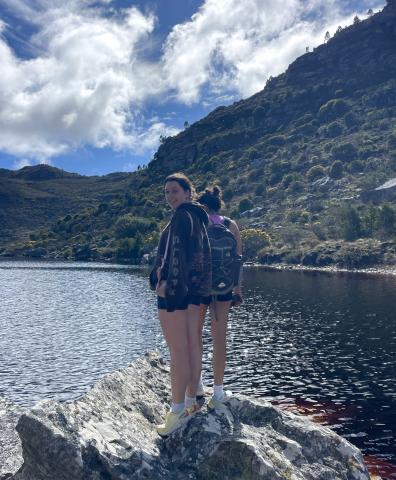Kate Stefancik
IES Health, Culture, and Development, Cape Town, South Africa

Biography
How did studying abroad affect your academic and/or professional career?
Post study abroad, I want to live in Cape Town/South Africa after graduation. Studying abroad gave me the confidence to realize that I could move somewhere 8,000 miles away, without knowing anyone, and thrive academically and professionally. I have always been interested in the idea of living/working abroad, but I now have a clear direction and goal for my future.
How did you explore your hobbies, interests, and passions abroad?
Cape Town is a paradise for outdoor lovers. Almost every day I was able to get outside whether it was surfing, hiking, climbing, camping, diving, (safely) cliff jumping, or just having a relaxed beach day. South Africans and Cape Town travelers alike spend their days in nature, and there exists a beautiful harmony between the people and their environment. Amazing mountain ranges, beaches, animals, communities, forests, and even deserts are everywhere in South Africa. If nature and the outdoors is your passion, South Africa might be the study abroad location for you.
Why would you recommend your respective abroad program or location?
Aside from the stunning landscapes and unmatched nature, I would recommend South Africa for the people. As a 'less popular' study abroad location, there will likely be many opportunities for you to meet locals and make South African friends. The ability to befriend locals is priceless, as you will learn and experience far more than you ever could on your own accords. The IES Health, Culture, and Development program, in particular, focuses on integrative and experiential learning and offers you the chance to travel to Johannesburg, Botswana, Zimbabwe, and more as part of your coursework. Additionally, the program focuses on learning about community development practices and local healthcare systems up-close, and you will be introduced to amazing organizations and communities that will make you fall in love with South Africa ten times over again.
What should students consider when applying and preparing for their time abroad?
While many people have concerns about safety in South Africa, in my experience, as long as you stay alert and aware, you won't feel any less safe than you do in New Orleans. In fact, most South Africans are extremely friendly and welcoming, helping you feel comfortable and supported by the local community. One thing to keep in mind before traveling to any country in the Global South is that the pace of life is likely to be much slower than what you are used to. Things like infrastructure closings, protests/strikes, and a general lack of online information surrounding things like restaurants, hostels, and other forms of accommodation are going to be common. If you are a person who is uncomfortable with being spontaneous or not able/willing to adjust to this kind of lifestyle, I would suggest maybe rethinking your abroad location.
Share a story about a time you experienced cultural immersion.
During my time abroad, I joined the University of Cape Town Mountain and Ski Club (highly recommend, for the record). The club owns a mountain cabin located in a mountain range about 2 hours outside of Cape Town, and one weekend, a group of my friends and I organized a hiking trip to the cabin. The group consisted of about half study abroad students, and half South African students who were regular members of the Mountain and Ski Club. We spent the weekend talking and learning about each other and our respective cultures, and I ended the trip with a new group of South African friends who made my experience for the rest of my time abroad a thousand times more authentic and genuine than it ever could have been on my own.
